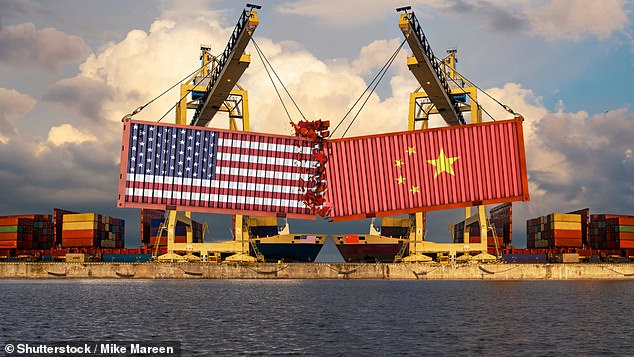The rewards may be rich, but doing business in China is as tricky as ever. Four people connected to British advertising giant WPP’s media buying agency GroupM have been questioned by police in Shanghai, but not detained.
The probe is a reminder of GSK’s troubles in the People’s Republic five years ago.
Details are sketchy. However, at a time of increased geopolitical tension between China and the West, the corporate sector is an easy play for Beijing.

Western firms face increasing pressure from Chinese authorities
Apple’s main microchip supplier Foxconn is being targeted for a tax audit and landuse infringements in three of the Chinese provinces in which it operates, according to the communist backed Global Times.
There is speculation that China is not impressed with the decision of Foxconn founder Terry Gou, who stepped back in 2019, to stand in Taiwan’s presidential election.
Beijing has no hesitation in asserting commercial pressure to support its political ends. It fears that Gou could split the opposition vote, smoothing the way for a victory by Vice President Lai Ching-te, who is running on a separatist platform.
Adding to the uncertainty, the Chinese authorities have also turned their fire on
Western medical devices companies. As part of a clean-up campaign, Siemens, Philips and GE Healthcare have been targeted in an effort to encourage local manufacturers. So far, little is known about China’s questioning of GroupM executives, but the current uncertainty is a potential problem for WPP chief executive Mark Read at a time when the company’s share are under pressure. They have dropped by almost a half from a 2023 peak.
GroupM is seen as a growth engine for WPP, with total income forecast to rise 7pc to £124m in the current year.
China has become the advertising powerhouse’s fourth largest market and Read has described it as offering ‘abundant opportunities’. Among those questioned by the authorities was the WPP China country managing director Patrick Wu.
The probe of WPP/GroupM executives may be no more than a shot across the advertising firm’s bows at a time when officials are cracking down on firms offering consulting services. Past experience of Beijing’s ruthless attitude to overseas companies suggests that WPP’s declared ambition could yet be thwarted.
Link vote
AS a victim of the implosion in Neil Woodford’s investment, I will be exercising my democratic rights by approving the £230m settlement reached by the regulator, the Financial Conduct Authority, with the authorised corporate director Link Fund Solutions.
The bar for approval is quite high, requiring 75pc of the holders by value and a majority of scheme members to endorse the scheme. Those of us involved in similar votes in the past, notably defeating the sale of Liverpool Victoria (LV=), know what a struggle it can be.
The FCA calculates that the scheme means that Woodford investors would see 77pc of their money back.
That may be a much better outcome than shareholders feared. But the whole purpose of fund investment is to de-risk exposure to the stock market. Link may have recognised its duty, but it is not the only party with some responsibility. More than four years have passed since the Woodford funds collapsed and still no forensic report has emerged from the FCA.
In that period, there has been runaway inflation. The real value of the pay-out is much less than 77pc.
Some 300,000 who invested directly or indirectly in Woodford funds via Hargreaves Lansdown will feel they deserve some compensation from the platform. At the very least there should be clawback from Woodford and his associates’ personal worth. Securing Link money is just the start.
Green shoots
The choice of Michael Green as the president and chief executive of the popular Swedish lender Handelsbanken will be of keen interest.
Could this be the same Michael Green who was the doppelganger of garrulous Defence Secretary Grant Shapps? Or maybe a return to combat for the Michael Green who ran ITV’s Carlton Communications. The answer is none of the above.
Swedish-born Green is a Handelsbanken lifer who the bank tells us ‘was happier among customers and businesses’ than lecturers at Gothenburg business school.
A lesson for British bank bosses?




